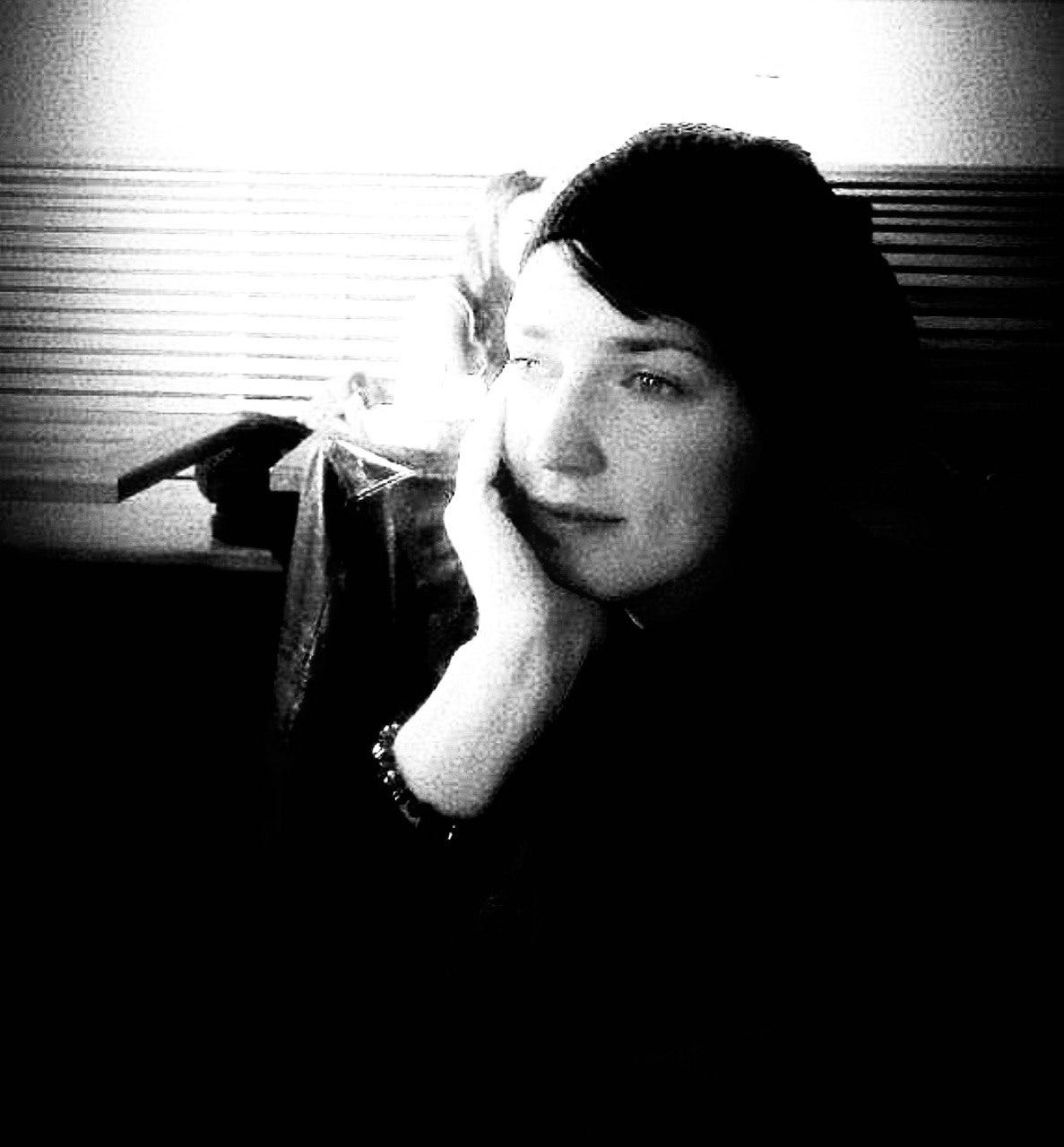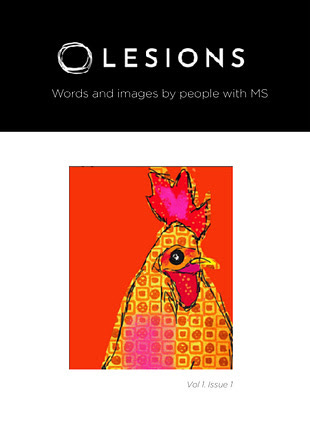Enduring an Invisible, Unpredictable Challenge
By Writer Dörthe Dolata
Dörthe Dolata (DD 🌻) is a writer, poet, and self-published author based in Kortrijk, Belgium. She intuitively explores themes of self-growth, compassion, empathy, and how to bring joy into our lives. Her self-published book, Being Eclipsed: Women Under the 'Care' of the Patriarchy, delves into the systemic mistreatment of women in Irish society and highlights how this social phenomenon reflects a worldwide issue. The book is a gift of forgiveness—for what we didn’t know, but now do. One of her poems appeared in the London Writers’ Salon anthology Vol. 4 in 2024. Through her Substack, she shares poetry, essays, and reflections inspired by her personal journey and observations of the world around her. While some of her work draws on her experiences with chronic illness, her focus extends to universal themes of transformation, resilience, and joy. When not writing, DD 🌻 enjoys Kundalini yoga, meditation, gardening, reading, connecting with like-minded people, and quiet solitude. Connect with her online at www.thecompassionategardener.com.

Enduring an Invisible, Unpredictable Challenge
It can feel as if you don’t exist, even when you know you are very much present.
Returning from London in September 1998 to attend university in Leipzig, Germany, marked a tumultuous chapter in my life. After two transformative years abroad, my body began reacting in unpredictable and painful ways. My au pair host, a general practitioner, was highly surprised to hear about the sudden appearance of my condition, especially since I had shown no signs of it while living in London. It all began with a reddish, itchy spot on my back that grew and spread, eventually escalating into severe outbreaks of hives. Within five months, I found myself regularly waking up with a sore throat, covered in hives, and struggling to breathe. At times, my face would swell so much that I joked about looking like the Hunchback of Notre Dame. Though it wasn’t funny, humor was sometimes the only way to cope with the bizarre sight that stared back at me in the mirror. Unfortunately, my family did not show much concern or support, leaving me to navigate this painful and isolating experience largely on my own.
A cat allergy was ruled out quickly, but the real cause remained a mystery. The doctors at the University Hospital Leipzig were as baffled as I was. They administered an antidote to help me breathe and reduce the hives a few times but couldn’t guarantee it wouldn’t happen again. I started meticulously listing my daily activities and diet, trying to identify potential allergens. My love for chocolate, coffee, and rollies—rituals shared with friends during our university days—came under scrutiny. The thought of being allergic to chocolate was devastating.
In March 1999, after my third emergency hospital visit due to breathing difficulties, I was diagnosed with chronic urticaria, an autoimmune condition. This elusive and unpredictable disease mirrored the uncertainty in my own life, making each day a challenge. While doctors speculated about various triggers—including a possible reaction to marijuana smoked at a party—no definitive cause was ever identified.
I remained skeptical until a hospital psychologist once suggested, “have you ever considered that you might be allergic to Germany or to people who may not be good for you? That this reaction could be psychological?” This idea had occurred to me, especially when my life partner years later suggested that I might have created the urticaria as a form of protection for my own humanity. As of 2024, the exact cause remains unknown, with ongoing speculation about potential links to my underactive thyroid or even genetic factors.
To be a human being among people and to remain one forever, no matter in what circumstances, not to grow despondent and not to lose heart– that’s what life is all about.
– Fyodor Dostoyevsky
Gradually, I learned to accept that the urticaria had become like a second skin, just like learning English had felt like a shell to crawl inside of. It seemed to shield me from situations and people who meant well but often caused me unnecessary pain. The diagnosis left me grappling with an invisible disability that flared up without warning, making everyday life unpredictable and isolating.
Living with chronic urticaria means dealing with an invisible, unpredictable presence.
Having worked in Ireland with individuals managing visible and invisible physical and psychological disabilities such as muscular dystrophy, epilepsy, ADHD, dyscalculia, chronic pain, and various learning disabilities, I realized over time that I am very much one of them. I have earned my place in a world that often turns a blind eye to anything considered difficult, or challenging the status quo.
It can feel as if I don’t exist, even when you know you are very much present. I now understood their struggles and empathized deeply with their experiences more saliently. Yet, despite my own understanding, I still often find myself overlooked and underestimated. Isolation is hard, especially when I dare to reach out but still face rejection or misunderstanding. The challenge of explaining my own invisible disability to others—especially when symptoms aren’t visible—often feels like an uphill battle.
During the first few summers of the 2000s, I frequently covered myself, feeling ashamed of the itchy and often sore bumps. I tried to conceal them with a white soothing ointment, hoping they would disappear, and eventually, they did. This invisibility reminds me of the wisdom in Antoine de Saint-Exupére’s The Little Prince: “It is only with the heart that one can see rightly; what is essential is invisible to the eye.”
This quote resonates deeply with me, as it underscores the need for empathy and understanding that goes beyond what is immediately visible. Over time, I learned to rise after enduring periods of paralysis from hives under my feet and behind my knees, becoming self-reliant and trusting my inner voice more than the external noise that often distracts and surrounds me.
When flare-ups occur, particularly under my feet or on my hands, where it feels like I’m in flames, I know I need to let go and rest. This means cooling and elevating myself, reducing my activity, and focusing on care and recovery. Coolness is essential—I prefer it, as I have never liked extreme heat. This also means allowing for healing and tuning in to what my body needs in the moment. It’s a practice of listening deeply to myself, recognizing when to pause and giving my body the compassion it requires.
As time passed, I learned to manage my condition through a combination of medical treatment and holistic practices. After trying many antihistamines with little success, I began receiving Xolair injections in 2023 where I now live in Belgium. Despite my discomfort with needles—a fear dating back to childhood, which is probably why I stopped acupuncture and have never gotten a tattoo—this treatment has been a turning point. It’s an expensive option which is luckily covered by my health insurance but has provided significant relief and prevented flare-ups. When I go for my treatment, before I feel the needle touch my skin and the liquid flows into my veins, I already feel uncomfortable—sensing the act of it before it happens. I started with injections every four weeks and now receive them every six weeks. Ever since beginning this treatment, I have been hive-free, which is a significant relief. However, when the treatment intervals were first extended, symptoms reappeared between the six-week dosage schedule. Despite this setback, I hold out hope of eventually extending the intervals further and possibly living without Xolair someday. This gradual reduction represents a hopeful step toward greater independence and normalcy.
Alongside this treatment, I practice Kundalini Yoga and meditation every day, both of which helps me manage stress and maintain balance in my life. Breathing exercises are crucial, especially in stressful moments when anxiety can easily flare up. Reminding myself to breathe deeply helps calm my nervous system, though, being human, I sometimes forget. This lapse can allow anxiety to take hold, but like with gardening, (another stress-reducing pastime of mine) I know that change and growth take time, so I continue to work on it.
Gardening has become crucial, offering a grounding connection to nature and a way to stay true to myself. Digging in the soil, nurturing plants, and witnessing growth provides a sense of peace and fulfillment, reminding me of the resilience and beauty in life’s cycles, and believing in a new tomorrow.
Walking barefoot has always been one of my simple pleasures, whether on grass or beach sand. However, I discovered that my chronic urticaria could reappear unexpectedly, as it did when I walked barefoot on the beach during the summer of 2022. This experience underscored the unpredictable nature of my condition, turning a beloved activity into a source of fear and discomfort.
Living with chronic urticaria has been a lesson in resilience and self-care over the years. The condition’s unpredictability means constantly adapting and finding new ways to cope.
One coping mechanism is humor. Humor allows humanity to be present and works as a crucial tool to navigate the absurdity of sudden flare-ups. Humor has taught me to prioritize my well-being and seek out genuinely kind and supportive relationships.
As I reflect on this journey, I realize that chronic urticaria, like many invisible disabilities, challenges not just the body but the spirit, and impacts those around me as well. It’s not that time necessarily heals, but it has allowed me to accept the presence of my chronic condition. This journey demands patience, self-compassion, and a willingness to embrace the unknown. In Elizabeth Taylor’s words:
“You just do it. You force yourself to get up. You force yourself to put one foot before the other, and… you refuse to let it get to you. You fight. You cry. You curse. Then you go about your business of living. That’s how I’ve done it. There’s no other way.”
Despite the difficulties, I continue to find strength in unexpected places—whether through medical interventions, yoga, breathing exercises, gardening, connecting with other sensitive and intuitive individuals, or simply sharing my story through my writing.
Print and ebook Lesions Vol. 1 is out now.
Are you a writer, musician, artist, or filmmaker living with a chronic condition? Submit to Lesions by emailing editor.lesions@gmail.com. See the full submission guidelines here.






Thank you for sharing your story!